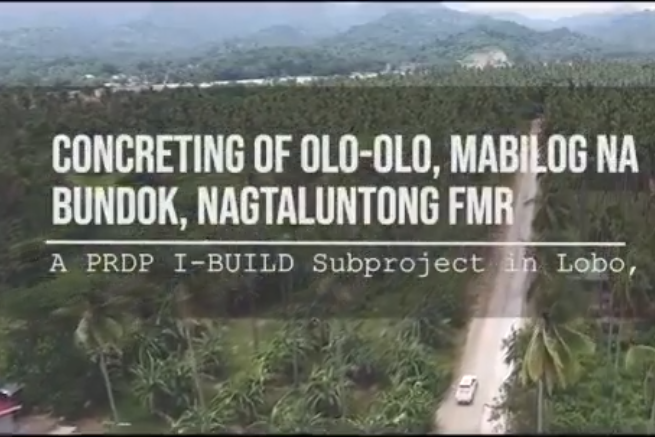How One Road Project in Lobo, Batangas provides hope and boost economic opportunities to Local Farmers
Photo linked from PRDP CALABARZON Concreting of Farm-to-Market Road, Barangay Olo-olo, Mabilog na Bundok, and Nagtaluntong
“Ginagamit dito sa aming transportasyon at pagdadala ng mga produkto namin dito ay sa pamamagitan lang ng kabayo o pinapasan lang po naming ang aming produkto. Pag panahon ng tagbaha or tag-ulan, nahihirapan po kami sa pagdadala ng aming produkto sa aming pamilihang bayan dahil wala po kaming pagdalhan kaya po yung mga produkto namin dito ay inaabot ng bulok at kaya po nabubulok yun dahil inaantay naming bumaba ang tubig ilog bago naming madala ang produkto naming sa pamilihang bayan.” (We either transport and deliver our crops by our horses, or we carry the crops ourselves. During rainy season, specifically when floods occur, we struggle to transport our products to the market because we had to wait for the flood to subside. And as we couldn’t transport it to the town in time, they became rotten.) — Mr. Virgilio Magtibay, Barangay Captain of Nagtaluntong, Lobo, Batangas.
Imagine you live in an area where you must either carry your harvest or rely on horses to transport it, and when it’s the rainy season, it is nearly impossible for you to bring your crops to the market. This is the reality for most Filipino farmers, including Mr. Virgilio Magtibay. In a video interview produced by PRDP Calabarzon, he talked about how it is difficult to transport their goods during the rainy season, which causes the crops to perish as they wait for the river’s water level to subside.
Agriculture is the backbone of the Philippine economy, employing 40% of Filipino workers and covering 47% of the country’s land area. However, the industry has long been undervalued and has faced a multitude of challenges, including loss of government regulation over agricultural products, limitations in the supply chain, and dwindling agricultural areas. Poor rural roads in the country and the unforeseen weather conditions like heavy rains causing landslides and flooding increases the risk to farmers and their crops while they are being handled. This predicament was not unique to Lobo, Batangas, where horses were the sole dependable mode of transportation from upland communities. Farmers’ produce were negatively impacted because of being unable to cross the river after flooding renders it impassable.
But there was light in sight.
In 2016, a partnership between the Philippine Rural Development Project (PRDP), and Municipal Government of Lobo, Batangas produced an infrastructure subproject that would improve economic opportunities and provide safer routes to the town proper. About 7 barangays, including 4 upland villages, have benefited from the completion of the 8.06 km concrete road, exposing their agricultural products and tourist attractions without worrying to cross any river.
It was made possible by Thinnkfarm (formerly MinndMap) through the guidance of Dr. Ernesto Gonzales, the late economist and the lead author of the feasibility study, and Mr. Ariestelo Asilo, who gathered socioeconomic data and conducted a market-driven analysis. Through their active involvement with the community, they were able to instill hope and uncover possibilities for the residents of Lobo, Batangas.
This initiative was also linked to a project funded by JiCA through the Department of Agrarian Reform and Department of Public Works and Highways.
This road project in Lobo, Batangas is a remarkable example of how collaboration and community engagement can transform people’s lives. It is important to highlight the contribution that agriculture plays in the Philippine economy and to facilitate efforts that will help the industry prosper.
Kindly watch the embedded video (click here) produced by PRDP CALABARZON and witness the transformational change brought about by this project in Lobo, Batangas. Let us continue to support and promote initiatives that empower communities and create sustainable solutions for our agricultural sector. — EXCELLAINE ELUMBA

